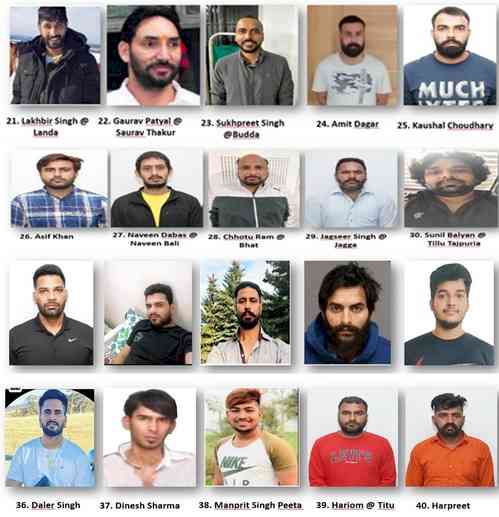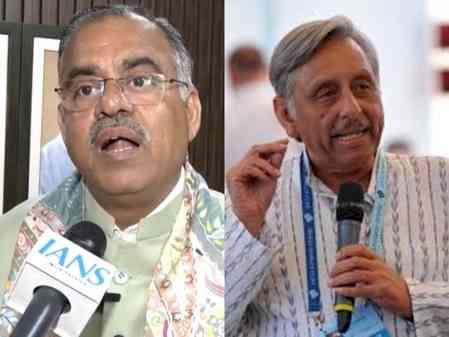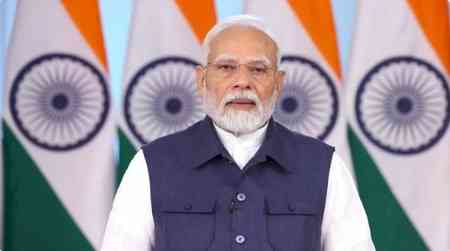NIA intensifies campaign against Khalistani terrorists, announces rewards on 5 BKI operatives
Stepping up its crackdown on Khalistani terrorist campaign in the country, the National Investigation Agency (NIA) on Wednesday announced cash reward of Rs 10 lakh each for information leading to the arrest of ‘listed terrorists’ Harwinder Singh Sandhu a.k.a Rinda, and Lakhbir Singh Sandhu a.k.a Landa, for promoting terror activities of Babbar Khalsa International (BKI) in India.

New Delhi, Sep 20 (IANS) Stepping up its crackdown on Khalistani terrorist campaign in the country, the National Investigation Agency (NIA) on Wednesday announced cash reward of Rs 10 lakh each for information leading to the arrest of ‘listed terrorists’ Harwinder Singh Sandhu a.k.a Rinda, and Lakhbir Singh Sandhu a.k.a Landa, for promoting terror activities of Babbar Khalsa International (BKI) in India.
As per sources, the end objectives of both Rinda and Landa are to execute the tasks which may lead to a resurgence of terrorism in Punjab, for which Pakistan's ISI is backing them with highly-explosive Chinese grenades, AK-47 and MP-5 rifles and loads of ex-Chinese Army stock Star Pistols.
“Landa is based out of Canada, while Rinda is suspected to be in Pakistan,” said the sources.
The NIA had also announced a cash reward of Rs 5 lakh each for information on three associates of these terrorists, namely Parminder Singh Kaira a.k.a Pattu, Satnam Singh a.k.a Satbir Singh a.k.a Satta, and Yadvinder Singh a.k.a Yadda.
An NIA spokesperson said that all five are wanted in an NIA case relating to BKI’s terrorist activities aimed at disturbing India’s peace and communal harmony and spreading terror in Punjab.
The NIA had registered the case under Sections 17, 18, 18B, 20, 38 & 39 of UA(P) Act, 1967.
“The wanted terrorists are accused of commission of terror acts and activities, besides raising funds for the BKI, a banned terror outfit, through smuggling of terrorist hardware and narcotics into Punjab, and also through extensive extortion from businessmen and other prominent individuals,” said the spokesperson.
“They are also wanted in cases relating to commissioning of targeted killings, as well as targeting of law enforcement agencies in order to create an environment of terror in Punjab,” said the spokesperson.
NIA investigations have further shown that these terrorists have been engaged in recruiting new members for the BKI by promising them monetary benefits. They have also established a network of operatives in various countries to further their terror activities in different parts of India.
The spokesperson confirmed that Rinda is a Pakistan-based ‘listed terrorist’ and member of the BKI, while Landa is a resident of Harike village in Tarn Taran district, Punjab.
“Pattu hails from Baghelewala in Ferozpur district, Punjab, Satta is a resident of Naushera Pannuan, Punjab, while Yadda belongs to Chamba Kalan, Tarn Taran district, Punjab,” said the spokesperson.
These individuals are believed to be connected to various criminal activities in Punjab.
The spokesperson further said that any specific information leading to the arrest of the five wanted terrorists can be shared with the NIA headquarters in Delhi or the NIA branch office in Chandigarh.
Sources hinted that most of the Khalistani terrorists are based out of Canada, Australia and Pakistan.
“Most of the gangsters after committing heinous crimes go to Canada as they are backed by the banned outfit Sikhs for Justice (SFJ). From there and with support from SFJ, they operate the entire nexus, including drugs trade, extortion, and money laundering, among others. Without SFJ's support, it is not possible,” said a former cop, who did not wish to be named.
In a recent public gathering in Ahmedabad, Punjab Chief Minister Bhagwant Mann had hinted at the potential detention of a "big gangster" in Canada, yet this revelation remains unverified by the central agencies.
Then Punjab Chief Minister Amarinder Singh, during Canadian Prime Minister Justin Trudeau's visit to Amritsar in 2018, had reportedly raised concerns about how the Canadian territory was being exploited against India's interests.
However, no substantial action was taken by the Canadian government in response to these concerns.


 IANS
IANS 










